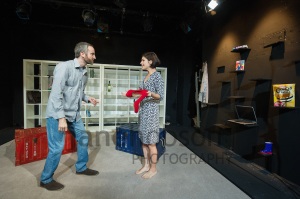Review: Why Can’t We Live Together?
Steve Waters’ one-act-play ‘Why Can’t We Live Together?’ 
Steve Waters’ Why Can’t We Live Together? traces the history of a married British couple against a backdrop of world affairs, (specifically the Iraq war and the ‘war on terror’). It does so via a device that is both aesthetically pleasing in its quirkiness and episodic in structure. Two microphones take the down-stage corners; the periphery of stage space is littered with significant objects from the couple’s relationship. Each episode of married life is introduced by him or her at the mic’ as they pick up an item and employ it in a short scene. There are staple situations – a proposal, a flat-pack ‘assemblage’, a birth etc… until we leave them, post separation, with the realisation that there is no turning back.
This trajectory is simple and poignant despite the absence of unexpected plot curve-balls or complications. The complications presented fit with the conventions of a divorce story: he has an affair with a mutual friend. Just as she is establishing independence, he asserts that he misses their intimacy. Having followed the pair in a series of emotional morsels, displaying passionate optimism to stoic disappointment, our investment in these characters is firmly engaged. However, the role of the wider world within this story is more questionable. The stage space is surrounded by a triptych of screens on which news footage is projected. We absorb familiar images and sounds from anti-war rallies and the aftermath of 9/11. It transpires that the couple’s opposing views on the effectiveness of protest has become a sticking point between them, which festers throughout their partnership and resurfaces to bond them after their separation. With this exception the socio-political landscape, as projected and occasionally referred to, seems incidental. The question begs: how far beyond a one-act-play’s initial concept/premise can we expect to be taken? And furthermore – how integral to a play’s plot should its political backdrop necessarily be?
©tamsinflower

